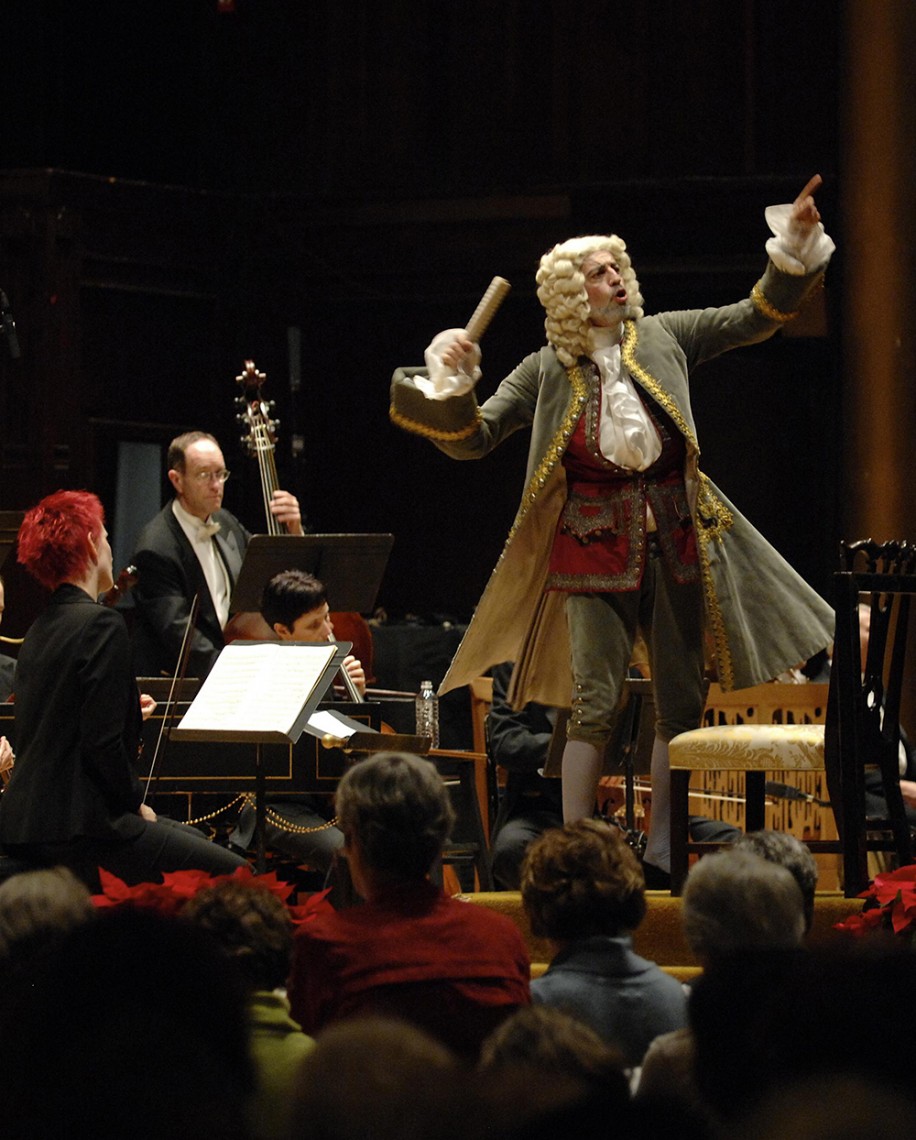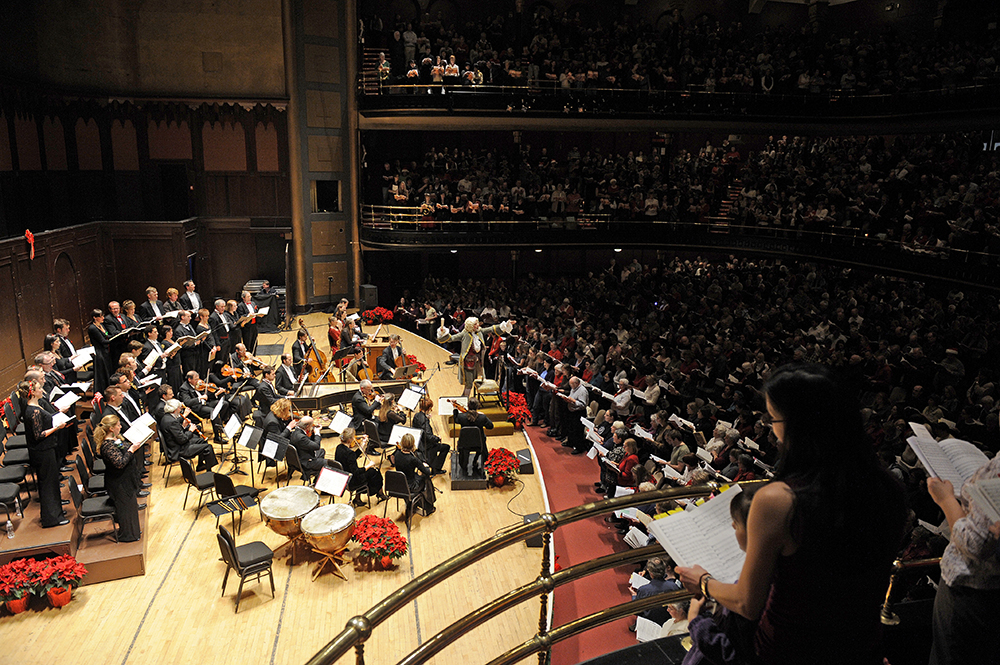
At any given time during the holiday season, hundreds of choirs will amass in churches and various concert halls across the world, to perform Handel’s Messiah. With the exception of Beethoven’s Ode to Joy, no other choral work has been so fixed into western musical culture. In fact for many, the tradition of going to a performance of the Messiah is as dear as beautifying the Christmas tree in the family living room.
But why?
It’s been 270 years since Handel first composed his two-hour long choral legacy… How could a piece of music composed so long ago become such an ingrained holiday tradition, especially in Canada – a country thousands of kilometers away from Messiah’s original Irish origins?
You don’t have to be religious to appreciate it; its message crosses all faiths and spiritual denominations. Even atheists would admit to getting goose bumps during some of its more sundry moments.
Handel worked on the 260-page score with an extraordinary flurry of creative energy over 24 days, (an astonishing feat in itself). He based the text on scripture compiled from the King James Bible, and from the version of the Psalms included with the Book of Common Prayer. The result was an extended reflection on Jesus Christ as Messiah, and it now represents one of the highest achievements in musical history.
At the time, in 1741, Handel was best known for his operas, but trends are fickle, and public tastes turned towards oratorios, which Handel was happy to oblige.
Handel’s oratorio uses a blend of varying styles, including English church music, elements from the German Passion-music tradition, and the Italian melodic style. He also wasn’t shy about including techniques from opera, such as arranging three of the Messiah choruses from Italian love-duets.
Messiah represented a new twist to the otherwise familiar choral music tradition, which England is so well-known for. The piece was also unique in that it gave audiences the chance to hear choral music sung in the King’s English.
Handel’s Messiah was announced with great fanfare around Easter, in Dublin, Ireland. It received rave reviews and its popularity meant many eager listeners were turned away from its debut.
A year later, Handel took it to London, where it was received with a storm of ire and controversy. This is because it was to be presented in theatres by singers associated with the stage, which prompted accusations of blasphemy.
“This was the first time the entire story of Christ’s life was depicted in an oratorio, but not as part of a service” explained Messiah expert Ivars Taurins, and founding director of the Tafelmusik Chamber Choir.
Handel quelled the controversy by using ticket sales to benefit a hospital for orphans he was actively working with. Messiah was also sung in the aid of three Dublin charities the year prior.
“When the public’s attention turned to the piece now as a vehicle for charity, the whole mood changed, and from that point on was a hit,” explained Taurins.
The goodwill resonated with the themes in the oratorio, and through the ages, it gave it a universal quality. No matter what faith people belong to, the solidity of tradition was placed upon the Messiah’s shoulders.
“The ritual that we look for to mark certain occasions: birthdays, weddings, funerals, and major holidays, whether they are sacred or secular, are rituals that we do to try to create some sort of order of the chaos, and that is a comfort to many people,” says Taurins. “It’s the same as a family going to see the Nutcracker or Charles Dickens’ A Christmas Carol, a Christmas movie, or a family get-together – Messiah is one of those ingredients.”
“Despite it being a Christian story, the message of goodwill towards men and peace on earth underlies the whole thing, and we seek that out. And when that message is so beautifully presented in this incredible music, one is uplifted by it,” said Taurins.
By the time of Handel’s death in 1759, Messiah had been performed 56 times, with all but 12 performances in secular venues.
It made its Canadian premiere in 1789 at St. Paul’s Anglican Church in Halifax, where according to a book by Howard Smither A history of the Oratorio, “several Gentlemen with Musick Bands of the Regiments” sang the final chorus.
Since then, the Messiah has been performed innumerable times across the country, with Toronto in particular as a hot bed for Messiah aficionados.
With at least 5 or 6 different versions of Messiah being performed on any given day during the holidays across the city, one might wonder if the repetition might a bit too much.
“Not so,” said Taurins. “I don’t think it’s ever a situation of a glut of Messiah’s where people have said enough is enough.” […] “I think whatever audience goes to these different performances… whether it be the Toronto Symphony or Tafelmusik… they will have their loyalties. I think there is enough of a population in the GTA to easily sustain that.”
One of the most popular Messiahs in Toronto is put on by the Tafelmusik Baroque Orchestra and Chamber Choir every year, and Ivars Taurins has been conducting them from the very beginning.
“For me, there is always something new discover. There is always the interaction between the new casts of soloists that you’ll have and what they bring to the music and to the text.”
This year, Tafelmusik’s annual production will include two Canadians: tenor Colin Balzer and baritone Brett Polegato (who also appears on Tafelmusik’s 2012 recording of Handel’s Messiah). There will also be two new singers joining Tafelmusik: soprano Lydia Teuscher from Germany, and James Laing, a countertenor from Britain.
Tafelmusik presents two different versions of Messiah. The concert music presentations are held at Koerner Hall, and the ever-popular sing-along Messiahs are held at Toronto iconic’s Massey Hall.

In regards to the sing-along, the whole idea is about audience participation. “Imagine that you’re an amateur singer who loves this piece,” said Taurins, “and you never have the opportunity to actually sing it with other people being accompanied by a professional orchestra and supported by a professional choir. You can image how thrilling it is to be part of that.”
Being a baroque ensemble, Tafelmusik presents the sing-along from an eighteenth-century point of view – and what better way to do that than by bringing Handel back to conduct it. Taurins dresses up as The Great Bear (Handel’s nick-name) and conducts the audience from the stage.
“The character of Handel is the conduit for the way Tafelmusik performs this piece, and also to gives a little bit more background to the work… I found over the years one of the unexpended bonuses with me up there as Handel, is that it’s a great icebreaker for the audience who may have some timidity about singing […] but it doesn’t mean Mr. Handel won’t yell at the audience if they are dragging or out of tune (laughs).”
While there seems to be no slowing the Messiah, perhaps Taurins is right. This is about ritual, one of the most powerful and deeply ingrained forces in our shared culture.
Charles Burney, an eighteenth-century musicologist said it best, “this great work has been heard in all parts of the kingdom with increasing reverence and delight; it has fed the hungry, clothed the naked, fostered the orphan, and enriched succeeding managers of the oratorios, more than any single production in this or any other country.”
Who can argue with that?
+++
Tafelmusik will be performing Messiah at Koerner Hall December 17th through 21. They will present their popular Sing-along Messiah on December 21, at 2:00 in Massey Hall. Tickets are selling fast.
- THE SCOOP | Royal Conservatory’s Dr. Peter Simon Awarded The Order Of Ontario - January 2, 2024
- THE SCOOP | Order of Canada Appointees Announced, Including Big Names From The Arts - December 29, 2023
- Ludwig Van Is Being Acquired By ZoomerMedia - June 12, 2023



